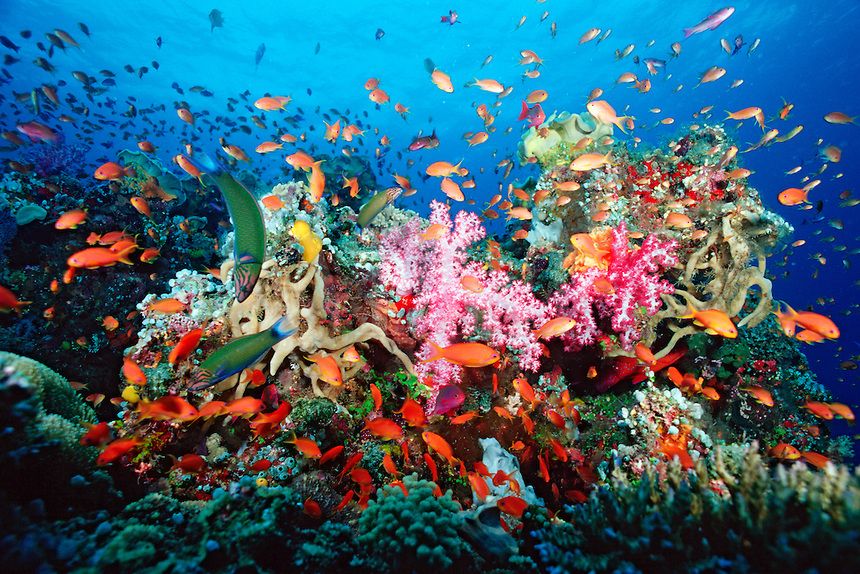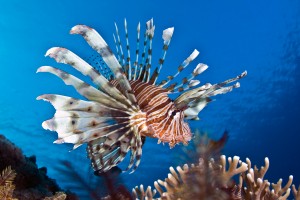News
Rising Temperatures In The Atlantic Ocean Could Pose Threat to Coral Reefs

Ecologists are reporting that rising temperatures in the Atlantic Ocean may be allowing certain tropical fish to spread to shallow waters that are becoming warmer, an expansion that could pose a significant threat to coral reefs.
A study of 40 species along the reefs off the North Carolina coast shows northward movement by the invasive and poisonous lionfish, according to researchers from the National Oceanic and Atmospheric Administration (NOAA) and the University of North Carolina-Wilmington, who published their findings in the September issue of Marine Ecology Progress Series.
“Globally, fish communities are becoming more tropical as a result of warming temperatures, as fish move to follow their optimal temperature range,” study author Paula Whitfield, a research ecologist at NOAA’s National Centers for Coastal Ocean Science, said in a news release. “Along the North Carolina coast, warming water temperatures may allow the expansion of tropical fish species, such as lionfish, into areas that were previously uninhabitable due to cold winter temperatures.”
The Indo-Pacific lionfish was first sighted off the east Florida coast in the late 1980s. They have since spread throughout the western North Atlantic, including the Gulf of Mexico and Caribbean, according to the news release.
In 2000, the lionfish was also reported off the coast of North Carolina. Historically, both temperate and tropical species live in the North Carolina reefs, confined to their range limits by water temperatures. But, the researchers noted, temperatures in this zone are becoming more tropical.
 Lionfish are viewed as a major threat to Atlantic reefs by reducing reef fish recruitment and biomass, the researchers said, and they may be involved with cascading impacts such as decreased coral cover on coral reefs.
Lionfish are viewed as a major threat to Atlantic reefs by reducing reef fish recruitment and biomass, the researchers said, and they may be involved with cascading impacts such as decreased coral cover on coral reefs.
For their findings, the researchers combined year-round bottom water temperature data with fish community surveys in water depths from 15 to 150 feet off the coast of North Carolina from 2006 to 2010.
“The temperature thresholds collected in this study will allow us to detect and to estimate fish community changes related to water temperature,” explained Whitfield.
“This kind of monitoring data set is quite rare because it combines multiyear quantitative fish density data with continuous bottom water temperature data from the same location,” added the study’s co-author, Jonathan A. Hare, NOAA Fisheries research oceanographer, in the release.
The researchers found the fish community in deeper water, from 122 feet to 150 feet with a winter mean temperature of 69.8 degrees Fahrenheit, was primarily tropical. They concluded that water temperature was a key factor in controlling their expansion.
And they noted lionfish have become the most abundant species in those areas. Although the lionfish were restricted to depths below 87 feet where the average water temperature was higher than 59.5 degrees, the fish could spread to shallow waters that are becoming warmer.
“The results will allow us to better understand how the fish communities might shift under different climate change scenarios and provide the type of environmental data to inform future decisions relating to the management and siting of protected areas,” said Whitfield.
Source: consumer.healthday.com
Gear News
Introducing the TR-80, IR-50 and CS-30 Regulators from DYNAMICNORD

Whether you are a beginner or a professional diver – with the three new main regulators from DYNAMICNORD, everyone will find their favourite regulator. They all look super stylish.
Excellent performance with the TR-80
Quality and performance are the be-all and end-all for regulators. It is not for nothing that the TR stands for Tec Reg. The innovative design of the TR-80 guarantees absolute reliability – even in ice-cold waters.

Perfect breathing effort at 0.8 J/l / certified for diving in waters below 10 degrees / structural design made of solid brass for best cold protection / membrane-compensated design with dry seal of the first stage / reduced exhalation effort thanks to optimized exhalation membrane and bubble deflector / adjustable Venturi (dive/predive) and adjustment knob for individual inhalation comfort / innovative design of the front cover prevents free-flow in strong currents or when diving with scooters / design made of sandblasted brass, matt chrome finish / 2 HP and 4 LP outlets / mouthpiece made of high-quality, anti-allergic silicone for maximum comfort.


Amazing underwater adventures with the IR-50
The IR-50 is the top regulator for advanced and experienced divers. Natural breathing is the essence of this regulator.

Ideal breathing effort at 0.8 J/l /certified for diving in waters below 10 degrees / compensated membrane / adjustable venturi (dive/predive) and adjustment knob for individual inhalation comfort/ outlet valve and deflector for minimum exhalation effort and reduction of bubbles on the face / design made of sandblasted brass, matt chrome finish / 2 HP and 4 NP outlets / mouthpiece made of high-quality, anti-allergic silicone for maximum comfort.


The Workhorse – our CS-30
For diving centres and diving beginners – the workhorse stands for strong construction, reliability and robustness. Perfect for your training.

Optimal breathing effort at 0.8 J/l /recommended for diving in waters above 10 degrees / non-compensated piston / adjustable venturi (dive/predive) / outlet valve and deflector for minimum exhalation effort and reduction of bubbles on the face / design made of sandblasted brass, matt chrome finish / 1 HP and 3 NP outlets / mouthpiece made of high-quality, anti-allergic silicone for maximum comfort.


Octopus OP-30
The OP-30 is the ideal addition to all DYNAMICNORD regulators. It is identical in construction to the CS-30.

The TR-80, IR-50, CS-30 (DIN & INT) regulators and the Octopus OP-30 are available from DYNAMICNORD dealers and in the online store.
DYNAMICNORD – Your Outdoor Companion.
Marine Life & Conservation
Paul Watson Released as Denmark Blocks Japan’s Extradition Bid

Renowned anti-whaling activist Paul Watson has been released from custody in Greenland after spending five months in detention. Denmark’s Justice Ministry rejected Japan’s request for his extradition, citing insufficient guarantees that his time already served in custody would be credited against any potential sentence.
The 74-year-old Canadian-American was arrested on July 21 in Nuuk, Greenland’s capital, when his ship docked to refuel. His arrest was based on a 2012 Japanese warrant related to a 2010 encounter in Antarctic waters. Japan alleged Watson obstructed operations and caused damage to a whaling research ship during efforts to disrupt illegal whaling. Watson has consistently denied these claims, maintaining his commitment to marine conservation.
Denmark, which oversees extradition matters for Greenland, concluded that while the legal conditions for extradition were met, the lack of assurances from Japan regarding time-served credit made extradition untenable.
In a video shared by his foundation, Watson expressed gratitude and relief, saying, “After five months, it’s good to be out… and good to know they’re not sending me to Japan.” He added that the most difficult part of his time in custody was being separated from his two young sons.
Watson is a pioneering figure in marine conservation, known for founding the Captain Paul Watson Foundation in 2022 after decades of activism with the Sea Shepherd Conservation Society. His bold efforts to defend marine life have earned him widespread support, including from celebrities and conservationists. His work has also been featured in the acclaimed reality TV series Whale Wars.
Watson’s lawyer, Jonas Christoffersen, praised the decision, stating, “We are happy and relieved that Paul Watson is now free.” He added that Watson is eager to reunite with his family and continue his vital work.
The arrest occurred while Watson’s vessel, the M/Y John Paul DeJoria, was en route to the North Pacific with a team of 26 volunteers to intercept a Japanese whaling ship. His foundation described the arrest as politically motivated and emphasized that Watson’s actions were focused on ending illegal whaling practices.
Japan resumed commercial whaling in 2019 after leaving the International Whaling Commission, asserting that whale meat is a cultural tradition. Conservationists, however, continue to challenge these practices, highlighting their impact on marine ecosystems.
Despite the challenges, Watson remains steadfast in his mission to protect marine life and bring attention to whaling practices. His dedication to ocean conservation has made him a globally respected advocate for the environment.
-

 News2 months ago
News2 months agoIconic SS United States to become the World’s Largest Artificial Reef
-

 News3 months ago
News3 months agoBook Review – 52 Assignments: Underwater Photography
-

 Gear News3 months ago
Gear News3 months agoDYNAMICNORD – New German diving brand enters the British market
-

 News3 months ago
News3 months agoExploring Cenote El Pit: A Diver’s Dream
-

 Gear News3 months ago
Gear News3 months agoTry BARE drysuits (and maybe even win one!) this Friday with Sea & Sea at North West Dive Fest
-

 Marine Life & Conservation3 months ago
Marine Life & Conservation3 months agoBook Review: Coral Triangle Cameos
-

 Blogs2 months ago
Blogs2 months agoDive the Egyptian Red Sea this Autumn with Regaldive
-

 News3 months ago
News3 months ago2024 Ocean Art Underwater Photo Competition Announced















